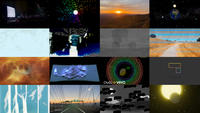Center for Computer Research in Music and Acoustics
Upcoming Events
Nat Condit-Schultz on Tempo, Tactus, Rhythm, Flow: Computational Hip Hop Musicology in Theory and Practice

Concepts and Control: Understanding Creativity in Deep Music Generation

Abstract: Recently, generative AI has achieved impressive results in music generation. Yet, the challenge remains: how can these models be meaningfully applied in real-world music creation, for both professional and amateur musicians? We argue that what’s missing is an interpretable generative architecture—one that captures music concepts and their relations, which can be so finely nuanced that they defy straightforward description. In this talk, I will explore various approaches to creating such an architecture, demonstrating how it enhances control and interaction in music generation.
Foreign/Domestic

FREE and Open to the Public | In Person + Livestream
Recent Events
The New Sound of New Music: Contemporary Composition and Modern Record Production Practices, two part lecture series with Murat Çolak

Homage to Ligeti | CCRMA 50th Anniversary

FREE and Open to the Public | In Person + Livestream
Distractfold x Graduate Composers

Works by: Celeste Betancur, Seán Ó Dálaigh, Mohammad H. Javaheri, Lemon Guo, Kimia Koochakzadeh-Yazdi, Calvin Van Zytveld, Mercedes Montemayor Elosua
Gerald Schuller: Perceptual and higher-level loss and distance functions for machine learning in audio and acoustics

Prof. Gerald Schuller will report on the potential transformative role of perceptual loss functions and distance metrics in enhancing audio and acoustic machine learning models, and their applications. He will cover theoretical foundations of perceptual loss functions, which mimic human auditory perception, and also more abstract, higher-level representations, and explore how these functions, along with novel distance metrics, significantly improve the performance of audio processing tasks. Applications involving loss functions for room impulse responses, audio similarity, and audio representations for cochlear implants will be discussed.
Prof. Marina Bosi will be hosting his visit.
Join us in Zoom if you cannot make it in person!
- 1 of 7
- ››
Past Live Streamed Events
Recent News
Poppy Crum Joins Advisory Board for Engineering & Technology Magazine's Innovation Awards
JackTrip: Syncing performances online, Stanford News

"Stanford-developed software enables musicians isolated by the coronavirus pandemic to jam together again in real-time ... A longstanding software program for online music playing has been optimized for slower, home-based internet connections."
https://news.stanford.edu/2020/09/18/jacktrip-software-allows-musicians-sync-performances-online/
By Adam Hadhazy
The Curious Composer: Jonathan Berger
- 1 of 18
- ››



